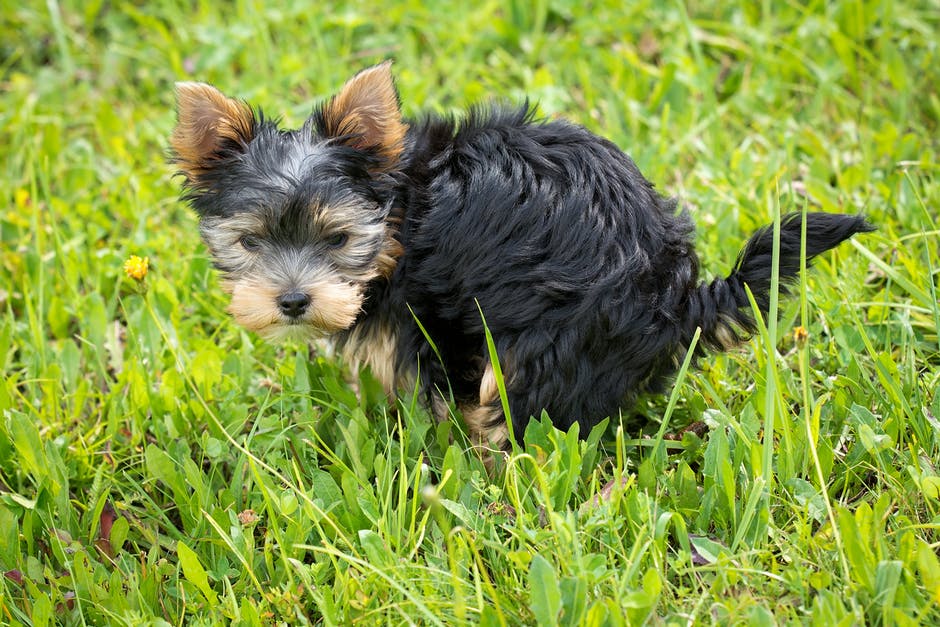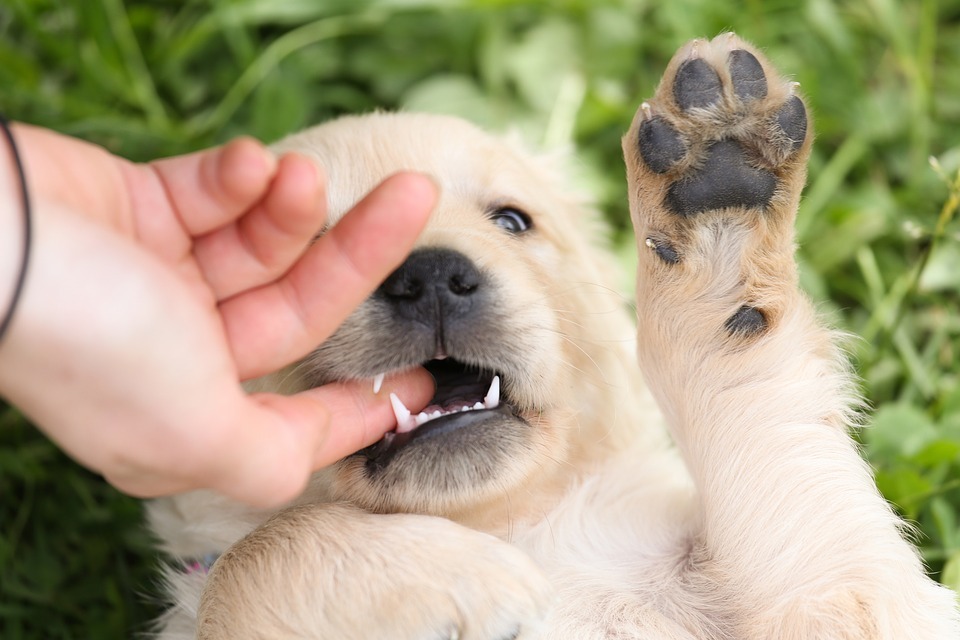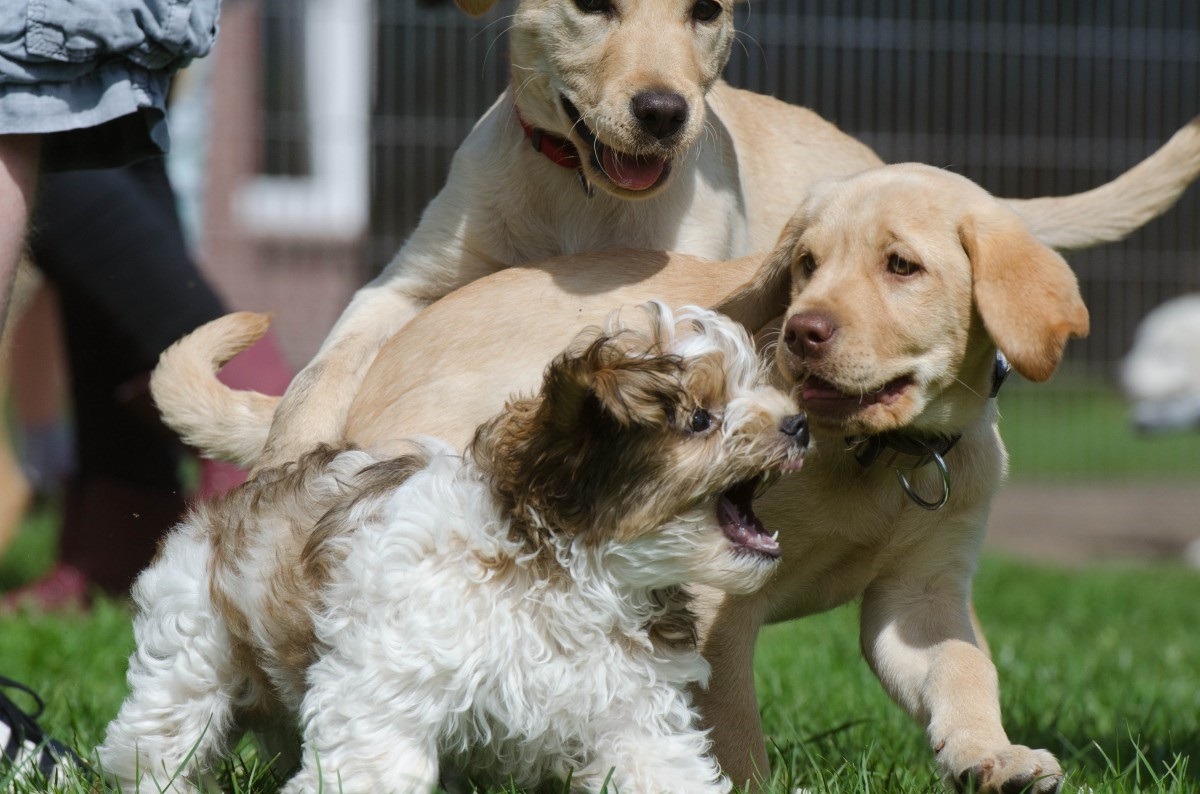If you’re adopting a new pup to your family, or if it’s your first time to get a puppy, you will encounter some behavior problems that are common to young dogs. Just like human babies, taking care of puppies will take effort, patience, and understanding. Inappropriate elimination, biting and chewing are among the most frustrating dog behaviors, but patiently training them will help you better control these problems so you can enjoy having them in your household. Here are some tips and tricks for training your puppy.
Housetraining
The goal of housetraining is to teach your puppies to eliminate at the right place. Inappropriate urination and defecation are very frustrating, as it can ruin areas of your home (talk about a dog poo in your new white couch!) and make your puppy unwelcome in other homes and public places.
Like babies, puppies don’t have a sense of control for their bladder and bowel movements just yet. Generally speaking, a puppy can control their bladder one hour longer for every month of age – so, if your puppy is 2 months old, he can hold his pee for about two hours. Be understanding during his first weeks. When the puppy is between 12 to 16 weeks old, they have enough control of their urges already, so you can begin house training him.
When you start house training, follow these tips:
- Keep a regular feeding schedule for your puppy. Depending on age, puppies will need to be fed three to four times a day. Feeding him at the same time each day will most likely cause them to eliminate at the same times as well, making housetraining easier for you both. A puppy typically wants to defecate around 5 to 30 minutes after eating.
- Watch out for signs that your puppy needs to eliminate. When your dog is circling, whining, barking, sniffing, be attentive and take him out right away. If your puppy is unconfined, he may bark or scratch at the door, and that’s a sign that he needs to go.
- Take your puppy out on the same spot each time to eliminate. Pick a “bathroom” spot outside – a place that you will establish as the proper spot to do his business. Start every morning by taking your puppy out (on a leash) on that spot to let him pee. Take him frequently to that spot – immediately after he wakes up in the morning, after a nap, after eating or drinking, after playing, or at least every 2 hours. Use a cue word to use before they go to remind them what you are asking them to do. As the puppy grows up he’ll learn to eliminate at the very same spot each time, as the familiar smell acts as a trigger.

- Supervise your puppy. Don’t give your puppy an opportunity to soil any part of the house. When he’s indoors, keep an eye on him. During house training, stay with him outside. If you happen to catch your puppy in the act, clap loudly to inform him that he did something unacceptable. Then, take him outside by gently pulling him by the collar or by calling him.
- Don’t punish your puppy for accidents. Accidents are common in puppies, but punishing them as a form of training won’t do him any good. Once the puppy was done eliminating at the wrong spot, it’s too late for correction since they can’t correlate your punishment for something they did earlier. Stay calm and remove the puppy from the spot and simply clean it up. Punishing will only make them afraid of you and often does more harm than good.
- Reward your puppy. Every time your puppy successfully eliminates outdoors, praise him or give him treats immediately after he’s done. Rewarding your dog for going outdoors will effectively teach him that he’s doing the right thing. Just make sure they are really finished before rewarding since they might get distracted if you praise too soon.
- Remove your puppy’s water dish before bedtime. For around 2 hours before bedtime, pick up your puppy’s water dish to avoid peeing accidents during the night.
Biting

As puppies learn to discover the world around them, they involve their mouths and teeth. They bite and nip on other dogs and people’s hands, limbs or clothing as a means for exploring their environment. Biting and nipping is a natural instinct for young dogs, especially when they are teething. While this kind of behavior may seem cute for small puppies, it will not remain endearing as the puppy gets bigger and bigger. Since he doesn’t recognize the sensitivity of your human skin (and is not aware that you love that expensive shirt you’re wearing), it can also cause scratches, wounds or bruises, and can ruin clothes.
It is important to help your puppy curb this behavior before it causes a lot of damage. Here are some tips on how to control this biting behavior:
- Teach your puppy to be gentle. The moment you feel your puppy’s teeth touch any part of your body or clothing, make a high-pitched yelp to make him think that he’s hurting you. Puppies naturally learn bite inhibition when playing with other puppies: when they are playing and wrestling, they tend to bite each other all over, but whenever a puppy receives a bite that’s too hard, he will yelp and stop playing. The offender is often taken aback and learns not to bite too hard again so their play won’t be interrupted. But if you’re raising one puppy only, they have to learn that from you. Startle them with your voice, then immediately walk away from him and ignore him for a while. This will teach them that when he starts to bite, his playmate will go away. After that, go back to your dog and resume whatever you were doing with your puppy.
- Give a chew toy whenever your puppy tries to gnaw on you. Puppies often tend to mouth on people’s hands when they are patted and stroked. Whenever your puppy’s face reaches out for your hand before you can even pet him, distract him by giving a toy from the other hand. As soon as you see his mouth reaching for your hands, just let out a firm “No!” and then redirect the attention to a chew toy. When you are out on a walk, carry his favorite toy with you. Whenever he tries to bite at your feet and ankles (or pants), instantly stop moving, take out the toy and entice him with it. If the puppy grabs the toy, continue moving.
- Encourage non-contact forms of play. When you are trying to stop puppies from biting, don’t play wrestling, rough play and chase type of games with them. This only encourages nipping and biting. Instead, play other types of games that don’t involve close contact, like fetch. Once you have trained your puppy not to bite, keep toys in your pocket whenever you go out so you can distract them once he feels like mouthing you.
- Provide opportunities for your puppy to play with other puppies. Dogs are pack animals – they are not meant to be alone. Let your puppy play with other puppies, and also with other friendly, vaccinated adult dogs because socialization is important for their development. Also, if he spends a lot of his energy playing with others of his kind, he’ll feel less motivated to engage in rough play with you. If you don’t have friends, family or neighbors that have dogs, consider enrolling your puppy in dog daycare.
- Consider using a taste deterrent. If other techniques aren’t effective, try using a taste deterrent like bitter apple spray. Apply it to areas of your body and clothing that your puppy likes to nip or mouth, then stop moving and wait for his reaction. Praise him or give him a treat when he lets go of you. Use the taste deterrent for at least two weeks, and your puppy will most likely learn to stop mouthing you. This also helps in controlling your puppy’s chewing habits. You can spray a deterrent on your furniture or belongings so the puppy will learn to leave the object alone.
- Never hit your puppy. Playful mouthing is a normal behavior for young dogs, so be patient and understanding. Don’t hit or slap your puppies for this behavior because they will only be afraid of you. This may also trigger their aggressiveness, which will be a bigger problem when they get older.
Chewing
Chewing is natural for dogs as they use their mouth to explore the world around them. But it can easily be a problem if your dog loves to chew on your books, your shoes or your beloved designer bags. If this behavior is not corrected, it will become a long-standing problem in your home. Here are some tips to train your dog not to chew:
-
- Puppy-proof your home. When you get a new puppy, you automatically become a better housekeeper. If you were used to having your things readily seen so you don’t have to search through your cabinets anymore when you get a puppy these things will change. Now, you have to keep objects out of reach, especially tempting ones like paper, tissues, shoes, socks, cushions, bags and stuffed toys. Electrical cords must be kept out of sight or covered to prevent chewing that might lead to electrocution (and of course, damage to your appliance or gadget). Keep them away from items that might spill or cause poisoning, like household cleaners, chemicals and possibly toxic-when-eaten houseplants. Close doors of your rooms that are not puppy proofed, or keep the puppy in a crate when he cannot be supervised.
- Encourage appropriate chewing. Don’t stop your puppies from chewing – instead, give them appropriate things to chew. Provide chew toys for your dogs like rubber chew toys, nylabones, dental chew sticks, or balls. You may also go for puzzle toys that can be filled with soft food to keep them interested and make it more appealing. When you catch your puppy in the act of chewing that is not meant to be chewed, tell a firm “no,” then offer a chew toy as a trade. Praise him for chewing the appropriate object. This way, the puppy will lose interest in chewing your things.
- Rotate chew toys. Your puppy might get bored if you give him the same old chew toy every day. Provide at least three chew toys but not give them all at one time; rotate it a couple of times a week. It keeps a puppy occupied while your precious belongings are left undamaged.
- Make sure your dog gets exercise to avoid boredom. A tired dog is a good dog. If you give your dog enough exercise, he won’t have energy left to chew and ruin your things.

